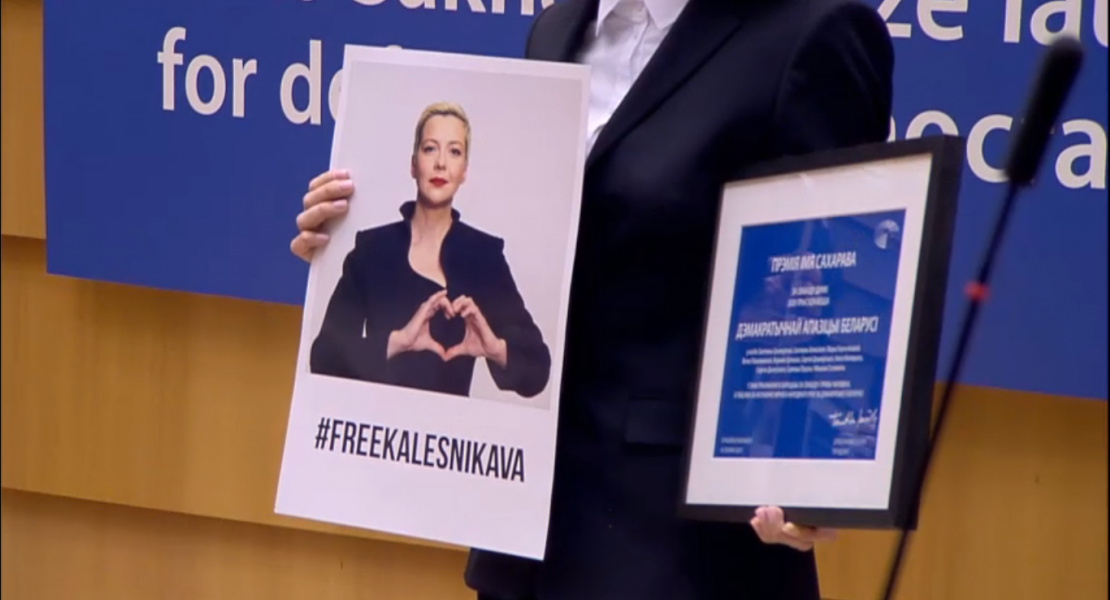Blog article by Nicolas Butylin
Belarus is in the fifth month of democratic protests, which continue to attract a lot of attention in Europe and around the world. Initially with great solidarity and unprecedented coverage, the European community met the Belarusian people’s desire for a future based on democracy and the rule of law, which was particularly reflected in soft power measures and later in concrete sanctions against the Lukashenka regime. Since the autumn of 2020, the Belarusian democracy movement has repeatedly been the recipient of various human rights awards, which shows that the democratic world community continues to value the sacrifice of the Belarusians and thus tries to support them morally.
The most famous award is the European Parliament’s Sakharov Prize for Freedom of Thought, which is awarded to the entire democracy movement in Belarus and will be ceremonially consigned to representatives of the movement on December 16th. The nominee of the Belarusian democracy movement is further evidence of both material and non-material support for a European Belarus since the prize is endowed with 50 000 Euro.1 Representing the entire protest community, the Coordinating Council, first and foremost presidential candidate Sviatlana Tsikhanouskaya, will receive the award. The Council has set himself the task of entering a political dialogue with the authorities in Minsk after the presidential elections in August 2020 had been forged. The prize, which bears the name of probably the most famous Soviet dissident, is also a reminder within the European Union that the fight for human rights and freedoms is one of the cornerstones of the European values and is also a top priority at the Union’s external borders. For the Belarusian opposition, too, the award is a great step forward since it has never been as united as it is today in the time of independent Belarus.
But the EU is not the only one to recognise the Belarusians' struggle for freedom and democracy. The Right Livelihood Award Foundation from Stockholm, which awards the so-called "Alternative Nobel Prize", also honours people or institutions fighting for a better world. This year, the prize goes to the Belarusian human rights activist Ales Bialiatski, who is the first Belarusian citizen to be awarded this honour. He was co-founder of the human rights organization Viasna, which to this day is one of the most important independent actors in Belarus and documents human rights violations by the state authorities. Especially in view of the increasingly difficult free reporting of protests in Belarus, the work of the non-governmental organisation deserves the greatest recognition. In addition to the intangible appreciation for Beljazki's work, this prize is also financially supported with almost 100 000 Euro.
The awarding of human rights prizes to Belarusian activists has also had an impact on individuals. One of the most famous figures of the opposition movement, the currently imprisoned Maria Kalesnikova, was also awarded the Human Rights Award 2021 of the Gerhart and Renate Baum Foundation from Germany. Kolesnikova is one of the protagonists who stand for the "female revolution" alongside Tsikhanouskaya and Zepkalo in Belarus. In connection with the award, former Federal Minister of the Interior Gerhard Baum spoke of a "bow to the courage and uncompromising nature of a fighter".2 Since Kolesnikova is still in Belarusian custody, her sister, who lives in Ukraine, will receive the prize on her behalf, as well as the prize money of 10 000 Euro.
At the diplomatic level, too, a prize went to Belarus. In November 2020, the first joint Media Freedom Award was presented by the British and Canadian Foreign Ministries to the Belarusian Association of Journalists. The Canadian government has honoured independent journalists in Belarus with their “ongoing commitment to journalistic ethics and principles and its perseverance and self-sacrifice in the face of increased targeted crackdowns on media in Belarus”.3 As in the case of Viasna, the Belarusian Association of Journalists has become an eminently important NGO in Belarus, which continues to document and publish human rights violations, the use of violence and the falsification of elections. By restricting the accreditation of foreign reporters in Belarus, one of the last independent actors in the country will be playing an immensely important role. The organisation linking free and independent journalists in Belarus was already the recipient of the European Parliament’s Sakharov Prize in 2004.
The extent to which the numerous awards and human rights prizes can change the political situation in Belarus is difficult to predict just from the perspective of the receiving awards. It is certain that the awards will give a boost to the fight for freedom, democracy, and human rights for many individuals, but also for the remaining independent organisations. Certainly, regarding the prizes the Belarusian democracy movement will go down in history. In many years people will see the Belarusian opposition on a same list with Nelson Mandela, Alexander Dubcek, Kofi Annan, and organisations such as Reporters Without Borders and Memorial, thanks to the human rights prizes awarded in autumn and winter 2020.
1 https://www.europarl.europa.eu/news/en/press-room/20201016IPR89546/the-2020-sakharov-prize-awarded-to-the-democratic-opposition-in-belarus
2 https://www.zeit.de/news/2020-12/12/menschenrechtspreis-fuer-inhaftierte-kolesnikowa-in-belarus
3 https://www.gov.uk/government/news/united-kingdom-and-canada-announce-recipient-of-first-media-freedom-award
Originally published on Bialorus 2020 website in Polish

